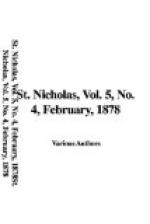They could never tell afterward how long they remained at the oasis. It seemed years, but I suppose it could not have been more than weeks. All day long they looked wistfully toward the horizon, in hopes of a caravan, but the caravan never came. Slowly the dates dwindled in the bag; slowly the precious water diminished in the well; a little longer, and starvation would be upon them. They scarcely spoke to each other those last days, but sat each by himself in a sort of dull despair. At night, when they fell asleep, they dreamed of food, and woke in the morning to feel themselves still hungry. It was horrible!
Then came a morning when they rose to find the hard desert outline, which they knew so well, vanished and gone, and in its stead a smooth, shining lake, fringed with trees and dotted with feathery, fairy islands. So near it seemed, and so real, that it was as though they heard the ripple of the water and the rustling of the wind in the tree-boughs. Mustapha stared as though his eyes would burst from his head; then he gave a wild cry, and was rushing away; but his father held him fast.
“Stay, my son! Stay, Mustapha! It is no lake,—it is a device of Satan. What you behold is the mirage, spread by devils for men’s destruction.”
“Let me go!” shrieked Mustapha, writhing and struggling.
But even as he strove, the soft water-outlines shifted and trembled; the lake rose in air, melted, and sailed off into curling mists; the trees, the whole fair picture, dissolved, and the well-remembered sands and black rocks took its place. With a cry of horror, Mustapha slid through his father’s arms to the earth, hid his face, and cried like a child.
[Illustration: “THEY SAW THE FORM OF A GIGANTIC CAMEL.”]
Next morning, only one date was left in the bag. Ahmed put it in his son’s hand with a mournful look.
“Eat, my son,” he said; “eat, and then we will die. Allah il Allah!”
A long silence followed; there seemed nothing more to say. Suddenly, from afar off, came to their ears the tinkle of a bell.
Mustapha raised his head.
“Is it the mirage again, my father?” he asked. “For it seems to me that I hear the bell from the neck of Solimin, our camel.”
Eagerly they listened. Again the bell tinkled, and, looking through the bushes, they saw, floating toward them, as it seemed, the form of a gigantic camel. Soundless and still, it moved rapidly along. Behind, but much farther away, other forms could be seen, still dim and indistinct, veiled by the mist of driving sand.
Suddenly Mustapha gave a start.
“My father,” he cried, in an excited whisper, “it is Solimin! I do not mistake! What other camel ever resembled Solimin? Do you not see his lofty hump,—his arched neck? Does not the bell tinkle as with the voice of home?”
Then, half raising himself, he gave, with all the power of his voice, the well-known call.




